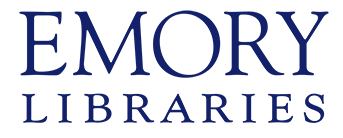 This is the final post in a series of interviews conducted by the Woodruff Library with the 2017-2018 Woodruff Library and Emory Center for Digital Scholarship (ECDS) Fellows. Funded by the Laney Graduate School, the Woodruff Library and Emory Center for Digital Scholarship (ECDS) awards fellowships to advanced graduate students expecting to complete their dissertations by the end of the fellowship period. Fellows are placed within the Woodruff Library and ECDS to work in an area related to their subject specialization or interest, culminating in a formal presentation in the spring.
This is the final post in a series of interviews conducted by the Woodruff Library with the 2017-2018 Woodruff Library and Emory Center for Digital Scholarship (ECDS) Fellows. Funded by the Laney Graduate School, the Woodruff Library and Emory Center for Digital Scholarship (ECDS) awards fellowships to advanced graduate students expecting to complete their dissertations by the end of the fellowship period. Fellows are placed within the Woodruff Library and ECDS to work in an area related to their subject specialization or interest, culminating in a formal presentation in the spring.
1. Tell us a little bit about yourself. Where are you from? What’s your favorite book? What’s your favorite thing about Emory/Atlanta?
I am a PhD candidate in Latin American History focusing on Modern Brazil. Originally from Canada, I had peeked over the border most my life before moving to Atlanta to start my PhD. After five years here, I still find it difficult to define or explain Atlanta for those who haven’t been here. In all its sprawling greenness and cultural diversity, the more time I spend here the more I enjoy it. While Emory for me is primarily a place for work, it is also a familiar space for countless cups of coffee and conversation, and a place where I have found great friendships.
2. What are you researching for your dissertation?
Broadly speaking, my dissertation examines how governmental and institutional forces in Brazil worked on modernizing the country’s coffee industry between 1954 and 1989. I approach the coffee sector’s modernization as a process that was not just generated by the state’s efforts to implement development programs, promote new technologies, and transform labor relations in the fields. It was also guided by environmental forces that constantly challenged human efforts to create and control agricultural spaces, thus provoking the state to continue producing novel ways to develop and manage its coffee industry. In that sense, I analyze modernization as a continual process of negotiation that varied in intensity, rather than as a mere product of human actions and practices.
3. What interested you about the Woodruff Library Fellowship?
For us historians, the library and its librarians are our greatest resources. Often, however, we have little knowledge of how libraries are kept running and what kinds of work librarians engage in. The chance to learn more about supporting other academics by working collaboratively and facilitating research interested me personally and professionally. Moreover, this fellowship also offered considerable freedom for me to design my own library projects and contribute creatively.
4. What will you be working on this year for your Woodruff Library Fellowship?
My main project currently is co-creating an exciting Oral History Project at Emory. The project will compose a new archive with voices from the Emory community and experiences in Atlanta and the southern United States. We are pioneering this project with the oral histories and testimonies of first-generation college students at in Emory. I will also help coordinate regional conferences and workshops on emerging research tools for librarians and researchers, and develop a research guide and collection assessment for the growing field of environmental history.
